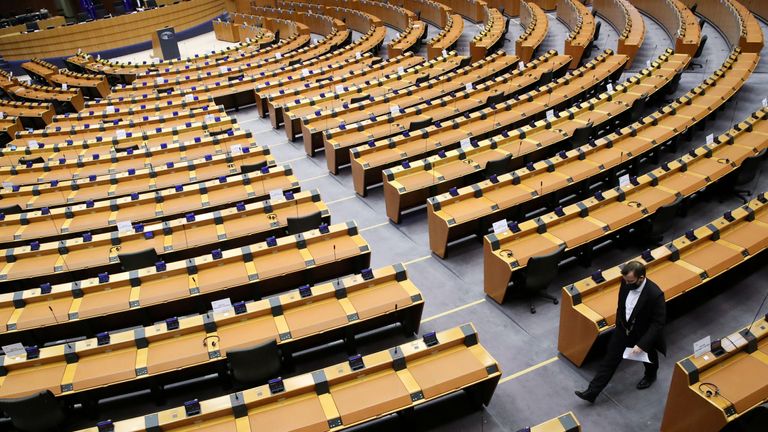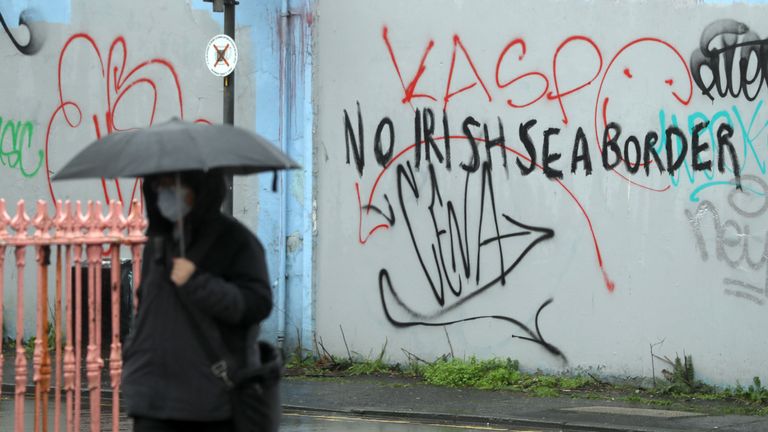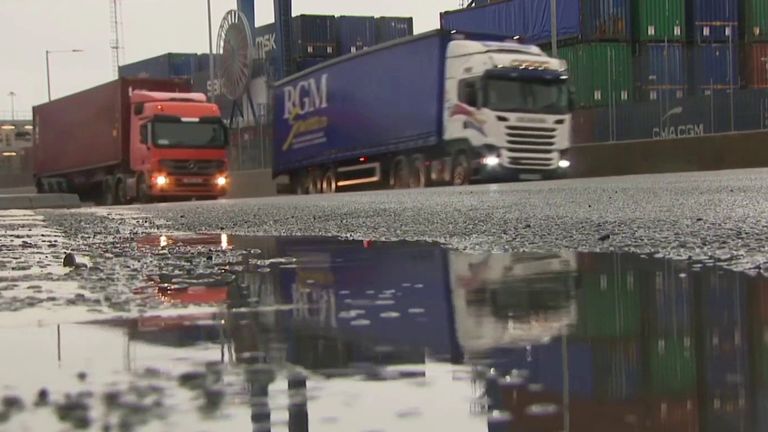Brexit: European Parliament declines to fix date of EU-UK trade deal vote amid new row over Northern Ireland Protocol
Tensions flare over the UK's unilateral action to extend grace periods for post-Brexit border rules for Northern Ireland.
Thursday 4 March 2021 15:19, UK
The European Parliament has declined to set a date to ratify the Brexit trade deal following a row over the UK's action in relation to arrangements for Northern Ireland.
Tensions over the Northern Ireland protocol, a key part of Britain's divorce deal with the EU, have flared again this week.
It comes after the UK took unilateral action to extend grace periods for businesses such as supermarkets and parcel operators, before they have to comply with new post-Brexit rules.
Light-touch regulation schemes on goods from the rest of the UK transiting to Northern Ireland had been due to expire at the end of March, but now they won't end until October.
Amid the threat of legal action against London, the European Commission has accused the UK of seeking to breach international law and condemned Britain's "clear departure from the constructive approach that has prevailed up until now".
The Irish government accused the UK government of having shown itself to be untrustworthy in negotiations over the implementation of the protocol
At a meeting on Thursday, the heads of groupings in the European Parliament chose not to set a date for a vote on the UK-EU trade deal, despite having been expected to do so, in protest at the UK's action.
An approving vote by the European Parliament is required for the full ratification of the Brexit trade deal, which has provisionally been in force since the end of the transition period on 1 January.
German MEP Bernd Lange posted on Twitter on Thursday: "Still valid: Should the UK authorities breach - or threaten to breach - the Withdrawal Agreement, through the United Kingdom Internal Market Bill... or in any other way, the European Parliament will, under no circumstances, ratify any agreement between the EU and the UK."
On Wednesday night, Lord Frost - the newly-appointed cabinet minister responsible for EU-UK relations - spoke with European Commission vice-president Maros Sefcovic after the bloc expressed concerns at the UK's action.
He told Mr Sefcovic the measures were "the minimum necessary steps" to allow time for UK-EU discussions to "continue without the prospect of disruption to the everyday life of people in Northern Ireland in the coming weeks".
And Prime Minister Boris Johnson said on Thursday: "We're taking some temporary and technical measures to ensure there are no barriers in the Irish Sea and to make sure things flow freely from Great Britain to Northern Ireland.
"Obviously these are matters for continuing intensive discussions with our friends. I'm sure with a bit of goodwill and common sense that all these technical problems are eminently soluble."
But Irish foreign minister Simon Coveney raised the prospect legal action amid the latest row.
"This is not the first time this has happened that they are negotiating with a partner that they simply cannot trust," he told RTE Radio 1 on Thursday.
"That is why the EU is now looking at legal options and legal actions which effectively means a much more formalised and rigid negotiation process as opposed to a process of partnership where you try to solve problems together, so this is really unwelcome."
Asked about Mr Coveney's remarks, the prime minister's official spokesman said: "Obviously we wouldn't accept that characterisation.
"We have worked closely with the EU throughout the Brexit period, not just in terms of the Northern Ireland protocol but with regards to the trade and co-operation agreement) that we agreed at Christmas time.
"We continue to work closely with them through the Joint Committee process and remain committed to the Northern Ireland protocol but we want to address those areas where there are issues that have arisen."
Labour's shadow Northern Ireland secretary, Louise Haigh, called on the prime minister to "take personal responsibility for finding lasting solutions that lower tension and make the protocol work".
"Unilaterally undermining his own agreement has only provoked further instability," she added.
Meanwhile, loyalist paramilitary groups in Northern Ireland have withdrawn their support for the Good Friday Agreement in protest at post-Brexit border arrangements.
In a letter to the prime minister, Loyalist Communities Council (LCC) said they no longer backed the 1998 peace deal due to the impact of the protocol.
They called for the protocol to be amended following weeks of issues with trade between Great Britain and Northern Ireland.
Northern Ireland's First Minister Arlene Foster said the action by loyalist groups was "very concerning".
"They've said they want to pursue a peaceful path, a political path - I do welcome that, I think it's important people recognise that," she said.
"But it is very concerning, also, that people who supported the Belfast Agreement have now decided they can no longer do so."
Mrs Foster added: "These were people who were great supporters of the Belfast Agreement at the time, I remember it very well, and they now feel the balance in the Belfast Agreement has gone."
The LCC represents paramilitary groups the Ulster Volunteer Force, Ulster Defence Association and Red Hand Commando.
Subscribe to the Daily podcast on Apple Podcasts, Google Podcasts, Spotify, Spreaker
In the letter to the prime minister, LCC chairman David Campbell wrote: "I have been instructed to advise you that the Loyalist Groupings are herewith withdrawing their support for the Belfast Agreement and its Institutions until our rights under the agreement are restored and the protocol is amended to ensure unfettered access for goods. services, and citizens throughout the United Kingdom.
"If the EU is not prepared to honour the entirety of the agreement then it will be responsible for the permanent destruction of the agreement.
"The LCC is prepared to play a meaningful role in seeking a workable solution however a starting point has to be the acceptance that a hard border on the island of Ireland, or between Northern Ireland and the rest of the United Kingdom has no cross-community support here and is therefore untenable."
The letter stressed the LCC leadership "is determined that unionist opposition to the protocol should be peaceful and democratic".
They also urged the prime minister to trigger Article 16 of the protocol, which is intended to be used when the arrangement is unexpectedly leading to serious "economic, societal or environmental difficulties".
It allows the UK or the EU to act unilaterally to avoid these difficulties.
Earlier this year, the EU threatened - and then abandoned - an attempt to invoke Article 16 as part of the bloc's row with drugmakers over COVID vaccines and its efforts to introduce export controls on jabs.






